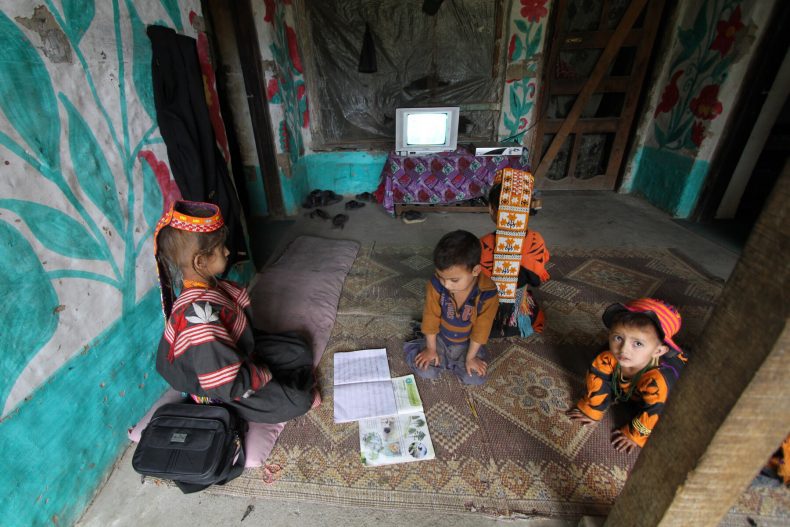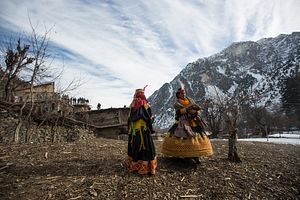Before entering into the Kalasha Valleys in northern Pakistan, we were stopped at a security checkpost, the last of many on the way. The guard at the post handed over a receipt and demanded a small amount of money in return, which was mentioned on the receipt. “The money you donate would be spent on the security and cultural preservation of the Kalasha community,” said the guard. The Kalasha are facing various political, security, economic, and social challenges and threats and it’s said their community could go extinct if not saved.
I paid double the requested amount with the stated intention that the money be spent on the preservation of this ancient indigenous community and its culture.
The Kalasha people dwell in three valleys — Rumbur, Bumburet, and Birir — also known as the Kalasha Valleys in Chitral district in Pakistan’s Khyber Pakhtunkhwa (KPK) province. Sharing a 380-kilometer porous border with Afghanistan in the north and west, the Kalasha Valleys are located in the southern gorges of the Hindu Kush Mountains. In a recent biking trip, my companions and I visited Bumburet Valley, which has the highest population of the Kalasha community.
The Kalasha are one of the oldest indigenous communities in Pakistan, and one of few surviving indigenous cultures in the world. But the Kalasha are struggling to save their rich and very ancient culture while caught between the Taliban to the west, bordering Afghanistan, and other socioeconomic and religious forces from the east and south in Pakistan.
According to the locals and various researchers, almost 3,000 to 4,000 Kalasha live in these valleys. The Kalasha themselves and a few researchers believe that the Kalasha are the descendants of Alexander the Great, and thus of Macedonian origin and an ethnic minority. They speak the Dardic language and practice an ancient polytheistic-animistic belief system. In Pakistan, they are also termed as “Kafirs” or nonbelievers. The Kalasha Valleys are also known as Kafiristan, the place of nonbelievers. As Pakistan moves more quickly toward the fervor of religious extremism and terrorism, the ancient community fears extinction.
Luke Rehmat, a social entrepreneur, has been working for the preservation of his community’s culture and identity since 2012. He told me, “the Pakistani state does not recognize my [culture’s] centuries-old existence and identity. After struggling for years, we succeeded to register Kalasha community in the NADRA [National Database and Registration Authority] form. But the state has yet to make it part of birth certificate and passport.” In Pakistan most of the ethnic, religious, and national groups are separately mentioned in these forms. Rehmat has been struggling to make his community part of those official forms and secure its identity in that way, but for now it seems that he still has a long way to go.
“Despite the fact that I have fulfilled and submitted the required documents, I don’t know why the Ministry of Interior is not including the Kalasha community in the remaining forms,” he said.
Pakistan is very diverse, both ethnically and religiously, but religious-leaning groups call it one Islamic nation while ignoring the thousands of years of history of many nations and communities. It would not be wrong to say that both KPK and the center are ruled by two right-wing inclined parties (the Pakistan Tehreek-e-Insaf and the Pakistan Muslim League-Nawaz, respectively).
“I am worried about the future of Kalasha,” Rehmat told me. “Our religion was not included in the recent census. I appealed to the Peshawar High Court and got the decision in our favor. But the census department moved to the apex court against the decision. The apex court has yet to hear the case and the census took place in 2017. We were not included.”
This is important because it throws into question the Kalasha population – and thus the health of their community as a whole. A spokesperson of the ruling party in KPK, Pakistan Tehreek-e-Insaf (PTI), Fawad Hussain Chaudhry, informed The Diplomat that “the population of the Kalasha has increased from 400 to 2,000 and the government is spending equally on the Kalasha whether they are Muslims or non-Muslims.”
But Rehmat does not agree with the spokesperson. He asserted, “As we researched the population of the Kalasha community was 4,200, but according to the latest census it is 3,800, so it has decreased.”
A fact-finding mission, led by the chairman of the National Commission for Human Rights (NCHR), Justice (Ret.) Ali Nawaz Chowhan, warned the concerned authorities that the indigenous Kalasha people are facing extinction and there is dire need of a roadmap for saving the community. The NCHR’s report, which was published in the last week of December 2017, titled, “Saga of Survival: The protection, preservation and promotion of constitutional rights of indigenous Kailash people,” notes the cultural, political, economical, security, and social threats faced by the Kalasha.
“There is no college and university in the valley and Kalasha can’t afford to go to other towns for studies because of financial hindrances. Another issue is of teaching only Islamic studies to Kalasha but not about their own culture, religion history, and tradition, is making it hard for them to know about themselves and preserve their identity. This is conversion through subtle indoctrination,” reads the report.
The report further notes, “unwilling conversions and cajoled marriages with non-Kalash are some of the ‘immediate threats’ facing the community.” The report highlights that the most urgent complaint of the Kalasha elders is that they are being deprived of their centuries-old claims of ownership over the silver oak forests in the Kalasha Valleys. The forest, the report points out, is important economically to the Kalasha.
However, according to the forest secretary for KPK, Nazar Shah, “The Kalasha are getting the royalties of the forests without any discrimination… [S]ilver oak is not available in the valleys and the community is getting their due shares when it comes to the forests and revenue.”
Rehmat disagreed, saying that “deforestation is under way.” According to him, “[I]nfluential people like Shahzada Maqsood Ul Mulk, CEO of Sarhad Rural Support Program, and his family [who are on close] terms with Imran Khan, the chief the ruling party in KPK, use their political power to encroach and issue permits to their own people.”
This “would definitely affect us economically,” Rehmat added.

Children of a Kalasha family do school work at home while watching TV. Photo by Danial Shah.
Chaudhry Mohammed Shafiq, a member of NCHR, also agrees with Rehmat. Shafiq told The Diplomat, “Having no authority over their ancestral lands is leaving a huge impact on the indigenous community.” Shafiq blamed “socioeconomic deprivation” for the community’s decline, and noted that this problem is driving Kalasha women to marry outside the community. “The ladies marry non-Kalasha men with the stated intentions of having a better life,” Shafiq explained, and then the women must convert to Islam. “If they don’t then [they] will be divorced.”
One of the very deadliest threats the Kalasha face, which was not mentioned in the NCHR’s report, is the incursion of Afghan militants into the Kalasha Valleys. In 2009, U.S. troops pulled out of Nuristan, the mountainous province of Afghanistan along the border with Pakistan, effectively surrendering the area to the Taliban. Since then, the Kalasha have witnessed various attacks by the Taliban.
“We did not have slightest idea who the Taliban were before these attacks and the establishments of security checkposts in the valleys,” said a Kalasha, who requested anonymity.
The Taliban released a 50-minute video on February 2, 2014, announcing an “armed struggle” against the Kalasha and Ismaili Muslims in the picturesque northern Chitral Valley and calling on Sunnis to support their cause. In July 2016, Afghan-based militants, reportedly Taliban, attacked Kalasha shepherds in Bumburet Valley. Most of the Kalasha ran; the Taliban slaughtered two shepherds and herded almost their 300 sheep across the border to Nuristan.
In this way, the Kalasha’s non-Muslim heritage has made them a target for militants across the border and religious hardliners in Pakistan. The Kalasha Valleys are unlike other towns of Pakistan, where strict Islamic codes are applied. With the valleys protected and separated by the Hindu Kush Mountains, Islam did not come that far. The Kalasha enjoy relative gender equality, with men and women both working equally on farms. Dressed in their traditional and unique handmade outfits, they can drink and dance without any cultural barriers. In fact, the Kalasha Valleys are famous for homemade wine and the community’s unique festivals attract tourists.
Shafiq, the NCHR member, unknowingly echoed Luke Rehman when he explained that a lack of official government recognition is a major barrier to preserving this unique culture. “In Pakistan, the biggest dilemma is that the state has yet to recognize the linguistic and ethnic minority,” Shafiq said. “Here, the state only recognizes the religious minority, so Pakistan views the Kalasha as part of KPK, not as a distinct community or ethnic or linguistic minority.
“When the Kalasha are not recognized as an ethnic minority or indigenous community in the country, then how would they get their due rights?”
Meeting the basic needs of a maximum of 4,000 people is not a herculean task. The NCHR report recommends that the Kalasha should have employment and educational quotas. If the state really is serious about preserving their culture and identity, then it should hand over their ancestral lands, the silver oak forests, to the Kalasha. The government can also help the indigenous community by exporting its wine to neighboring countries or within Pakistan and paying a basic amount to the community.
In the words of the chairman of NCHR who visited the Kalasha Valleys, “The time for [the] Kalash[a] is now and there is not a moment to waste because we fear there is much to lose. As an example of the diversity of our great nation, it is on individuals and institutions to protect the rights of a minority that has prospered in these valleys for centuries and now are face-to-face with an existential threat.”
Shafiq concluded, “There is no policy of the Pakistani state when it comes to indigenous communities. [On an] immediate basis, a policy for the protection and preservation of indigenous communities should be formulated in both the national and provincial levels.”
As my motor-biking partners and I were about to leave the Bumburet Valley, out of the blue I was inspired to ask a Kalasha whether the amount collected at the security checkposts we had passed would be invested in the Kalasha.
Without wasting a second, he replied, “No.”
Shah Meer Baloch is a former Visiting Fellow at the Institute for Peace Research and Security Policy at the University of Hamburg, a fellow of the Swedish Institute and the Institute for Foreign and Cultural Relations (Institut für Auslandsbeziehungen/IFA), and a freelance writer. He graduated from the National University of Modern Languages (NUML), Islamabad (Pakistan) in International Relations. His research focus is on Asia-Pacific politics, Balochistan issues, extremism and human rights. He is from Pasni, Gwadar district.

































